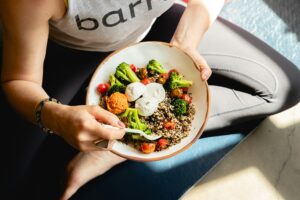
Dietary Strategies for Managing IBS: A Naturopathic Approach
IBS is a common digestive condition that causes abdominal discomfort. According to a study by Ami D. Sperber at the Ben-Gurion University of the Negev, the condition has a global prevalence of 4% to 15%. It’s most common in young and middle-aged individuals, but many of them are undiagnosed.
The condition varies in triggers and symptomatology from one person to another. It’s sometimes difficult to find the root cause of the issue, making it a long-term ailment for many people. This article will serve as a naturopathic approach to IBS, covering symptoms and how to treat it.
What Is IBS and Why Is It Difficult to Manage?
Irritable bowel syndrome (IBS) is a chronic condition that affects the gut and reacts unpredictably to stressors. It’s difficult to manage because the inconsistencies make it challenging to find the root cause.
IBS causes discomfort in the gut that manifests through the following symptoms:
- Bloating
- Abdominal pain
- Irregular stools (diarrhea and/or constipation)
- Gas
The condition is mainly diagnosed with the Rome IV criteria. This looks at the symptom patterns regularly, at least once per week.
Since structural abnormalities are not always present, IBS is considered a “functional condition.”
This means the symptoms are there, but standard testing doesn’t show much for diagnosis purposes. For this reason, studies at the Chicago Stritch School of Medicine show that 56% to 67% of IBS patients are misdiagnosed.
Symptoms change between patients because different stressors can have variable effects. Some people are sensitive to food, whereas others are affected by hormones, sleep, or stress. Since symptoms don’t always have a physiological source, the absence of a root cause makes it difficult to manage.
How Do Naturopathic Doctors Approach IBS?
A naturopathic doctor approaches IBS with a personalized, holistic treatment that goes after the root cause. This includes issues such as SIBO, food sensitivities, chronic stress, and imbalanced gut flora.
Naturopaths frequently use functional testing to uncover hidden triggers. This lets them catch issues that standard testing could otherwise miss.
Treatments are personalized and include the following methods:
- Diet Changes: Naturopaths recommend anti-inflammatory foods such as lean protein, fresh veggies, and healthy fats. It’s recommended to avoid trigger foods like gluten or dairy. Studies led by Raffaele Borghini on gluten-free diets suggest that gluten worsens IBS symptoms significantly.
- Herbs and Adaptogens: Herb-based therapies restore balance in the digestive system. Plants such as peppermint soothe the gut, whereas ginger supports digestion. Adaptogens such as Ashwagandha reduce cortisol levels that irritate the gut, whereas fennel relieves bloating.
- Lifestyle Changes: Lifestyle changes, such as the integration of physical activities and quality sleep, help manage IBS symptoms. Exercise reduces cortisol levels and stimulates digestion. This, in turn, improves sleep, which balances hormones in the gut.
- Stress Management: Stress causes flare-ups in IBS by triggering the sympathetic nervous system. This prompts the adrenal gland to secrete cortisol and catecholamines. Naturopaths recommend breathing exercises, yoga, and meditation to soothe the nervous system.
Naturopaths address triggers by offering individualized plans and longer consultations. This improves symptoms in the long term as the treatment goes beyond the gut flora. This is different from conventional medicine, which only offers quick fixes.
What Is the Best Diet for Managing IBS Symptoms?
The most effective diet for managing IBS symptoms is the FODMAP diet. This stands for fermentable oligosaccharides, disaccharides, monosaccharides, and polyols. These are short-chain carbohydrates (i.e., carbs) that the small intestine can’t absorb as easily.
High-FODMAP foods trigger fermentation, which leads to discomfort, excess gas, and bloating. Low-FODMAP diets reduce these carbs to minimize gas production.
FODMAP diets are staged in two phases:
- Elimination Phase: Complete removal of FODMAP foods for 4-6 weeks so the gut lining heals.
- Reintroduction Phase: Gradual introduction of high-FODMAP foods, in low amounts. This determines which fermentable foods were the problem to begin with.
If the FODMAP diet didn’t work, SCD, GAPS, and anti-inflammatory diets are also good alternatives. These diets remove specific carbohydrates that aren’t easy to digest (e.g., grains or dairy), but are more restrictive. An Omega-3-rich diet calms IBS symptoms and reduces inflammation.
It is important to note that your naturopath can do a combination of some of these diets and make sure they are working on your nutrition in a way that is not overwhelming to you, but still working toward getting results.
Which Foods Help Soothe the Gut and Reduce IBS Flares?

Gut-soothing foods reduce irritation and the likelihood of developing IBS flares. This includes easy-to-digest nutrients that are rich in soluble fiber. These are referred to as prebiotic foods, and their components serve as nutrients for the probiotics in your gut.
Common gut-calming foods include the following:
- Linseeds: Commonly referred to as “flaxseeds,” these are rich in soluble fiber and have a mucilaginous quality. Their nutrients coat the gut lining and promote smooth bowel movement.
- Oats: They have soluble fiber with a mucilaginous texture, which soothes the gut lining. They prevent irritation, making them good for those with IBS. Make sure to get certified gluten free oats to make sure there is no gluten cross contamination.
- Cooked Veggies: These are easier to digest compared to raw veggies and offer high nutritional content. Suitable options include squash, carrots, and zucchini. Avoid raw vegetables in a flare and favor cooked foods.
- Herbal Tea: Chamomile and fennel tea lower inflammation and reduce bloating and gas. They are a soothing option when you have an IBS flare-up.
Prebiotic foods are tolerated in small amounts, as they help maintain a balanced gut flora. This includes bananas, apples, and asparagus. Still, they have to be introduced gradually to prevent digestive discomfort.
Make sure to drink plenty of water to support the digestive process. Spacing your meals keeps the digestive system from overloading while improving nutrient absorption.
Studies at the University College Dublin show that 39.3% of people who consume fatty foods experience flares after eating. Going on a low-fat diet reduces the symptoms and soothes the gut. Think fried and fast foods.
What Foods Commonly Trigger IBS Symptoms?
Certain foods, such as onions, garlic, and processed sugar, trigger IBS symptoms by irritating the gut lining. This is especially the case in those who are sensitive to gas-producing, fermentable compounds.
The most frequent offenders include the following:
- Onions
- Legumes (lentils, beans, and peas)
- Cruciferous veggies (cauliflower, broccoli, and cabbage)
- Garlic
- Gluten
- Dairy
- Processed sugar
- Sugar alcohol
All of these foods feature fibers and carbohydrates that the small intestine can’t easily absorb. Once they reach the colon, the foods ferment when exposed to the bacteria.
Once this happens, the bacteria produce gas and other byproducts in the gut. Increased amounts lead to common IBS symptoms such as cramping, bloating, constipation, or diarrhea.
IBS is a highly reactive condition, but its symptoms vary from one person to another. What triggers one person may not be enough to trigger someone else with this condition.
For instance, some tolerate gluten well enough, whereas others have uncomfortable symptoms when exposed to it. A personalized diet based on individual triggers could make it easier to manage IBS.
What Role Does Fiber Play in IBS Management?
Fiber regulates motility and stabilizes bowel movements. Different types of fiber have specific bulking and softening effects, such as:
- Soluble Fiber: Water-absorbing, aids in stool softening, and slows digestion. It’s good for both diarrhea and constipation.
- Insoluble Fiber: Ensures bulking for stool and speeds up transit time. It’s best for constipation, as it can worsen diarrhea.
Keep in mind that adding too much fiber worsens the symptoms if you add it too fast. Instead, try to incorporate seeds that soften stool, such as linseed and psyllium, gradually.
Studies at the Faisalabad University of Agriculture on 77 patients proved this theory. Those who undertook a 12-week linseed treatment noticed better stool consistency without major diet changes. That’s because 75% of its fiber is soluble, whereas 25% is insoluble.
How Can Elimination Diets Help Identify Food Sensitivities?

An elimination diet removes trigger foods from your diet and gradually reintroduces them to determine food sensitivity. The first phase is temporary and aims to restore the gut lining. The reintroduction tests tolerance to foods you removed, revealing the problem ones.
A proper elimination diet looks like this:
- Remove frequent offenders such as dairy, gluten, eggs, processed food, sugar, legumes, and alcohol.
- Consume simple meals for about 2-3 weeks, focusing on lean protein, cooked veggies, and soluble fiber sources.
- Reintroduce the eliminated foods one by one, keeping the reintroductions 3-5 days apart.
Patients track the symptoms using a food diary. It’s important to record meals and log symptoms from the first stage of the elimination diet. The elimination identifies triggers based on your notes and has a diagnostic purpose.
Are Natural Supplements Effective for IBS?
Natural supplements have proven effective in alleviating IBS symptoms and preventing recurrence. Common options to relieve discomfort include peppermint oil, digestive enzymes, enteric-coated herbal extracts, and probiotics.
Here is how they reduce IBS symptoms, based on research:
- Peppermint oil: Peppermint has spasmolytic properties that relax the muscles and relieve abdominal pain.
- Digestive enzymes: Enzymes assist digestion by being supportive of the breakdown process. This reduces bloating and post-meal discomfort.
- Probiotics: These rebalance the gut flora and improve motility. Treatment also relieves inflammation and gas, especially with strains such as Bifidobacterium Infantis and Lactobacillus Plantarum.
- Herbal Extracts: Plants such as turmeric or fennel have an anti-inflammatory effect. These herbs soothe cramping and reduce bloating during flares.
Studies at the S.C.B. Medical College and Hospital of Cuttack show that peppermint oil decreases IBS cramps by 30.6% to 50.66% within four weeks.
It’s important to respect the dosage on the label or as instructed by the naturopath. Higher dosages don’t necessarily mean a better effect.
Enteric-coated botanicals are a better choice, as they prevent sensitive herbs from degrading in the stomach. This lets the supplement reach the gut, where it’s supposed to be.
Can Stress and Emotional Health Influence IBS?
Stress worsens IBS symptoms by interacting with the gut-brain axis. This affects motility and inflammation by suppressing the activity of the vagus nerve.
Stress increases visceral hypersensitivity, so pain perception in the digestive tract changes. It also has a modulating effect on the immune system because chronic stress dysregulates the HPA axis.
Relaxation techniques such as mindfulness and breathwork regulate the stress-responsive pathways. They reduce cortisol and offer an inner sense of calm that restores balance. Vagus nerve stimulation touches on the parasympathetic tone and offers a feeling of relaxation.
Stress disrupts digestion and your overall quality of life. Naturopaths incorporate stress-relief techniques to address physical and emotional triggers alike. This reduces the chances of IBS recurrence.
Why One Diet Doesn’t Work for Everyone With IBS
People respond differently to microbiome differences, hormones, and food sensitivity. These variables make it nearly impossible to create a one-size-fits-all diet. It has to meet one’s GI profile.
Personalized treatment plans work on these unique factors. Good diets require adaptation to your profile and symptoms, offering better results than a standardized plan. Customized meal plans use variable data to adjust food choices based on your sensitivities.
Standardized diets fail because they assume everyone has the same gut function. This does more harm than good, especially in complex cases. Hormones and food sensitivities influence the outcomes, since most individuals respond differently to stressors.
In Our Experience…
IBS is just that; a syndrome. The term encompasses symptoms which ultimately from a Naturopathic Doctors perspective is a signal that something is wrong.
The patients we see with IBS are usually the ones who have the most anxiety and lean toward a higher stress lifestyle. While we can’t remove stress from our life, we can try to engage in activities to lower stress, raise our resilience, and avoid situations we have control over that will not contribute to our peace and well-being.
When we work on the patient’s nervous system, adrenal glands and have a deeper look into the gut microbiome through stool testing, we can reduce these alternating constipation and diarrhea events and “IBS” symptoms.
The goal is to rebalance the gut and the nervous system and figure out if there is a trigger in their diet. When looking at the body as a whole, we are able to put the pieces together as to where the triggers are and then help to work on gut integrity.
Demulcent herbs have been helpful as well if the person has a leaky gut, and in general, IBS patients would benefit from these substances that increase protective mucosa and soothe the stomach and intestinal lining.
- Post Title : Dietary Strategies for Managing IBS: A Naturopathic Approach
- Author: Dr. Sparks, N.D
- Clinically reviewed by - Dr. Susan Cucchiara, N.D.
- Date Published :


